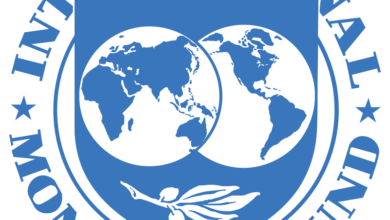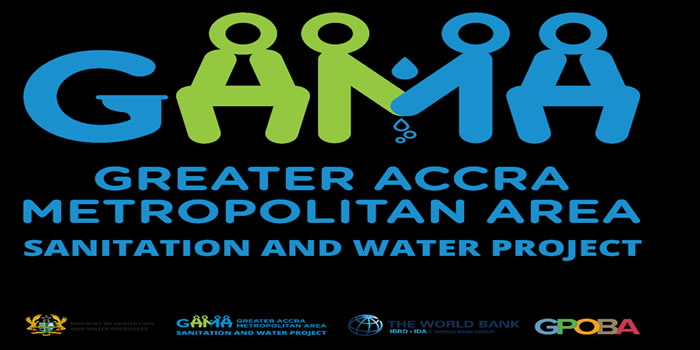
The above excerpts capture the sentiments of Mr. Ousmane Diagana, Vice President of the World Bank Western and Central Africa Region, as he conveys his satisfaction regarding the advancement of the World Bank project, which has the objective of providing household toilets to low-income families in the Greater Accra Metropolitan Area (GAMA) and Greater Kumasi Metropolitan Area in Ghana.
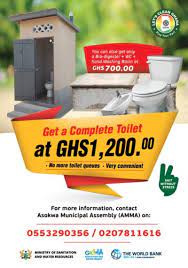
You may be curious about this project’s origins and why Ghana is a recipient. If you’ve just come across this project in Ghana for the first time, don’t worry, because for myself, I only became aware of it in October last year even though it has been in operation for some time now.
This project, GAMA -WSP, which stands for the Greater Accra Metropolitan Area (GAMA) Sanitation and Water Project operates in the Greater Accra Metropolitan Area (GAMA).
The GAMA originally consisted of 2 metropolitan assemblies in Accra (AMA & TMA) and 9 municipal assemblies of Accra. However, these Assemblies were later subdivided by the Ministry of the local Government into 25 Assemblies.
As you explore this feature, you’ll delve deeper into GAMA -WSP that has been active in the Greater Accra Metropolitan Area, Ghana for about 5 years and learn about its impact on the area.
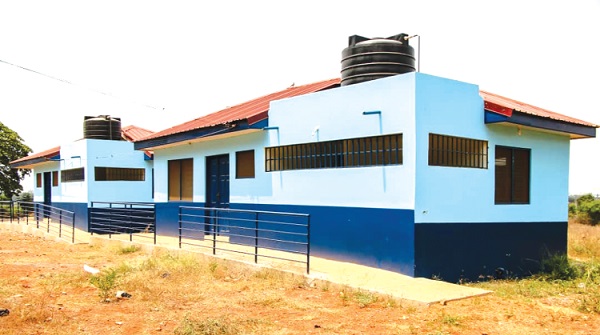
The birth of GAMA -WSP.
If the GAMA-WSP project was a person, it would answer the question about its age and place of residence as follows: “I am 9 years old, and I have spent the first 5 years of my life living in the Greater Accra Metropolitan Area (GAMA) since birth.”
The origins of this project can be traced back to 2015 when the Ghanaian government secured funding from the World Bank in response to a cholera outbreak that claimed the lives of 200 people, primarily affecting residents of the Greater Accra Region.
Project’s components and objectives
The GAMA-WSP, a $150 million initiative, focuses on enhancing sanitation and water access, with a particular emphasis on marginalized communities and environmental sanitation management within the GAMA region.
Managed by the Ministry of Sanitation and Water Resources and supported by The World Bank, the project encompasses four key components: improving water and sanitation access in low-income areas, expanding and upgrading the water distribution network, enhancing waste management and sanitation services, and strengthening institutions for long-term sustainability.
Its objectives revolve around increasing access to improved sanitation and water supply, especially in low-income communities, and improving environmental sanitation management.
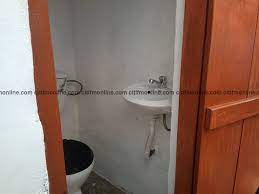
This also involves infrastructure development, technical assistance, social mobilization campaigns, and mechanisms for ensuring long-term service sustainability.
The objectives of the project also include increasing access to improved sanitation (household and institutional) and water supply to target low income beneficiaries of GAMA.
Before GAMA-WSP: Greater Accra’s Sanitation saga.
Before the advent of the GAMA-WSP, the sanitation situation in the Greater Accra region posed a significant challenge in Ghana, despite the country’s economic growth and its achievement of the Millennium Development Goal to reduce poverty and enhance water access.
The Greater Accra Metropolitan Area (GAMA) includes a range of municipalities and districts such as Accra Metropolitan, Ada West (New), Adentan Municipal, Ashaiman Municipal, Dangme East, Ga Central (New), Ga East Municipal, Ga South Municipal, Ga West Municipal, Kpone Katamanso (New), La Dade-Kotopon Municipal (New), La-Nkwantanang-Madina (New), Ledzokuku-Krowor Municipal, Ningo/Prampam (New), Shai Osudoku, Tema Metropolitan, Ashaiman Municipal, and the Greater Accra Metropolitan Assembly.
According to the 2010 census, the region had a population of 4,010,054, making it the second most populous region in Ghana, following the Ashanti Region. The area experienced rapid urbanization, with a majority of the population residing in urban areas, especially in densely populated low-income communities.
The sanitation challenges were multifaceted, encompassing issues related to leadership at the top levels, difficulties in the implementation of sanitation programs within municipal departments, and a reliance at the community level on inadequately managed public toilets.
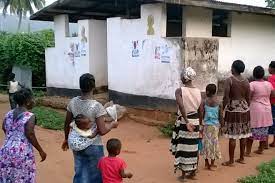
These problems were compounded by the hazardous practice of open defecation, often referred to as “flying toilets,” which posed health risks and diminished the overall quality of life.
The fragmented and piecemeal approach to environmental sanitation highlighted the urgent necessity for a more comprehensive and cohesive strategy to address the pressing challenges faced by the city.
That’s when GAMA-WSP emerged as the city’s saving grace.
After GAMA-WSP: transforming sanitation in Greater Accra Metropolitan Area.
The GAMA-WSP project has brought about a significant transformation in the sanitation and hygiene conditions in Greater Accra, effectively preventing cholera outbreaks and elevating hygiene standards.
The project, did not only meet it its original target but exceeded its initial expectation, providing more than twice the intended number of household toilets, benefiting a substantial portion of the population.
At the end of the parent project in 2020, the project achieved the construction of 28,541 household toilets to low income beneficiaries.
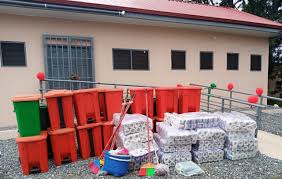
This achievement is underscored by the positive impact it had on 260 schools which were provided with 406 units of gender – and disability friendly institutional sanitation facilities, equipped with adequate water supply serving 200,000 school pupils.
Notably, the project also made significant contributions to environmental improvements, including the establishment of drainage systems and a substantial reduction in open defecation, particularly along the picturesque beaches of Accra.
Surprisingly, GAMA-WSP extended its influence to empower Metropolitan/Municipal Assemblies, promoting a results-driven approach to management and introducing innovative solutions like sanitation courts and joint sanitation police task forces.
The project’s outreach also encompassed educational and healthcare institutions, with a notable achievement and remarkable transformation of Kpone Methodist A and B schools, with over 1800 students now enjoying the convenience of two newly constructed 15-seater toilet facilities, courtesy of GAMA SWP.
Additionally, the Kpone Polyclinic received a generous gift from GAMA SWP in the form of a 5-seater toilet facility.
Dr. Jemima K. Mensah, the Head of the Kpone Polyclinic, warmly welcomed this development, emphasizing that the new facility is expected to alleviate the strain on the clinic’s existing infrastructure and enhance the overall well-being of patients, clients, and staff. These concrete outcomes highlight the significant and positive impact of the project.
Furthermore, GAMA-WSP expanded its impact on water provision, surpassing its target by establishing 10,040 new connections, which also contributed to the efforts against the COVID-19 pandemic.
Seeing is believing: where belief meets reality.
As I worked on this feature, it occurred to me – “You are now well-acquainted with the GAMA-WSP project and its effects on the Greater Accra Metropolitan Area. Why not take a leisurely walk through town to witness some of the GAMA-WSP initiatives in the Greater Accra Metropolitan Area (GAMA) for yourself?”
I did just that, and my journey led me to both institutional and household beneficiaries of the GAMA-WSP project, located within the Tema West Municipal Area.
This municipal area is one of the 261 Metropolitan, Municipal, and District Assemblies (MMDAs) in Ghana and one of the 29 MMDAs in the Greater Accra Region.
During my visit, I encountered impressive GAMA-WSP projects, including a well-constructed washroom for a government school and one-room and two-room household toilet facilities.
In my interactions with some of the project beneficiaries, they expressed their thoughts on the impact the project has had on their lives.
A household beneficiary, Kofi Asante stated, “The GAMA-WSP has been very helpful to us. Previously, the sewage toilet cars, known as ‘Toilet Puller,’ had to come and retrieve the waste, which polluted the air in our environment. The project has truly been beneficial to us.”
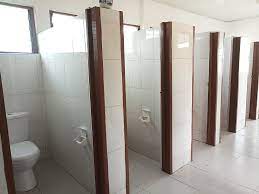
Another household beneficiary of the project, John Adamu emphasized, “This facility has been with us for quite a while now, and it has been of significant benefit. Just imagine, if someone needs to relieve themselves early in the morning or late at night, it has saved individuals from walking long distances to access a toilet facility across the road, thereby preventing potential accidents and robbery attacks.”
Another, Auntie Adwoa, further added, “It has also reduced costs because we no longer have to pay 1 cedi 50 pesewas every time we need to use a public toilet. With GAMA-WSP, we pay once, and they collect the waste when they come. GAMA-WSP has genuinely made a positive impact on our lives.”
These interactions underscore the fact that GAMA-WSP has indeed had a meaningful impact on the lives of the people in the GAMA region.
Following successful implementation of the parent project, the World Bank, in collaboration with the Government of Ghana and provided additional financing of $125m to the GAMA project to expand the results of the project in Accra and also expand the project to include the Greater Kumasi Metropolitan Area.
The additional financing components of the project started in April 2021 and expected to close in 2024.
So far, the GAMA additional financing phase has additionally provided over 14,000 household toilets as against the target of 12,000 and has also provided 64 more schools with institutional sanitation facilities.
Any challenges?
Yes, you may be surprised, as I was, to discover this. It prompted me to exclaim, “Eii! Really?” when a beneficiary presented a challenge.
However, I wasn’t entirely taken aback because I’ve always kept in mind that in life, there’s no such thing as 100% certainty.
Now, let’s discuss the challenges faced by some of the project beneficiaries. Household beneficiaries I spoke to earlier acknowledged that the project has its share of challenges.
One of them, Kofi Asante mentioned, “One issue we face is when the bio – digester of the toilet becomes full, and we call the office to inform them that our toilet facility needs emptying. To our surprise, they often do not respond promptly when we call, and when they do, they ask us to wait for a month for the waste to dry before they come to remove it.”
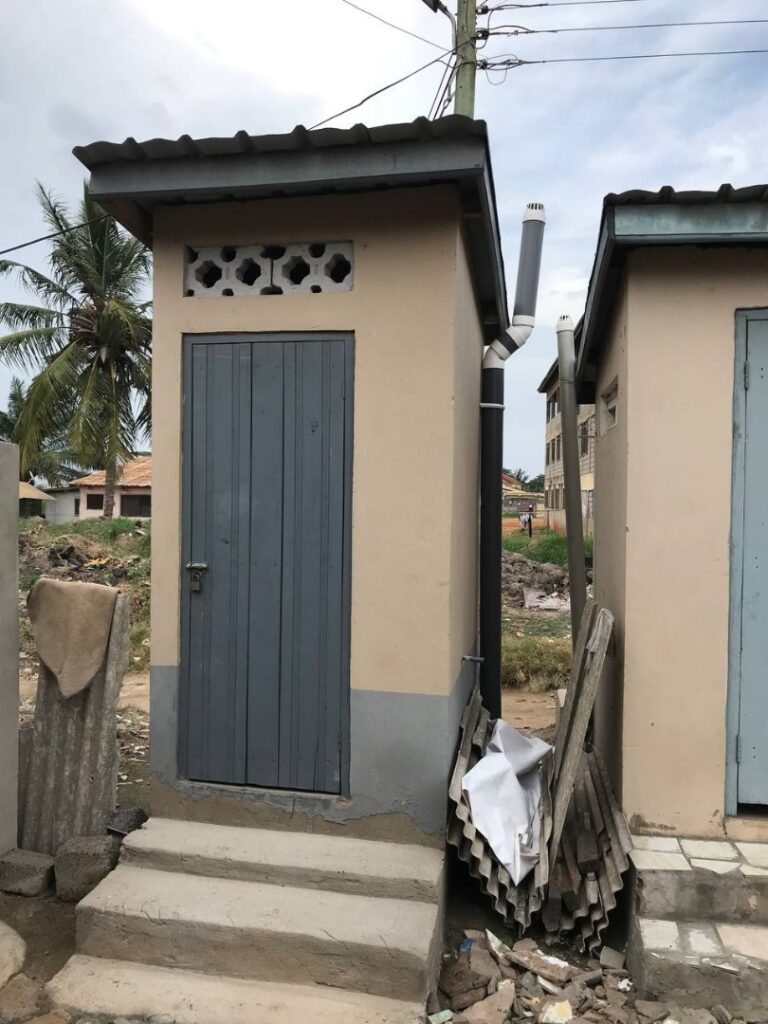
So, I further inquired, “What is life like during the month when the facility is locked?”
He responded, “life becomes unpleasant. This is because we need to relieve ourselves as we eat, and locking the facility leads to waste and pollution in our vicinity. Most mothers resort to open defecation and ‘flying toilets’ for their children, and even adults do the same. Some adults opt for public toilets, for which we have to pay 1 cedi 50 pesewas per use. Imagine having an upset stomach and having to pay extra for a service we’ve already paid for—it’s really frustrating.”
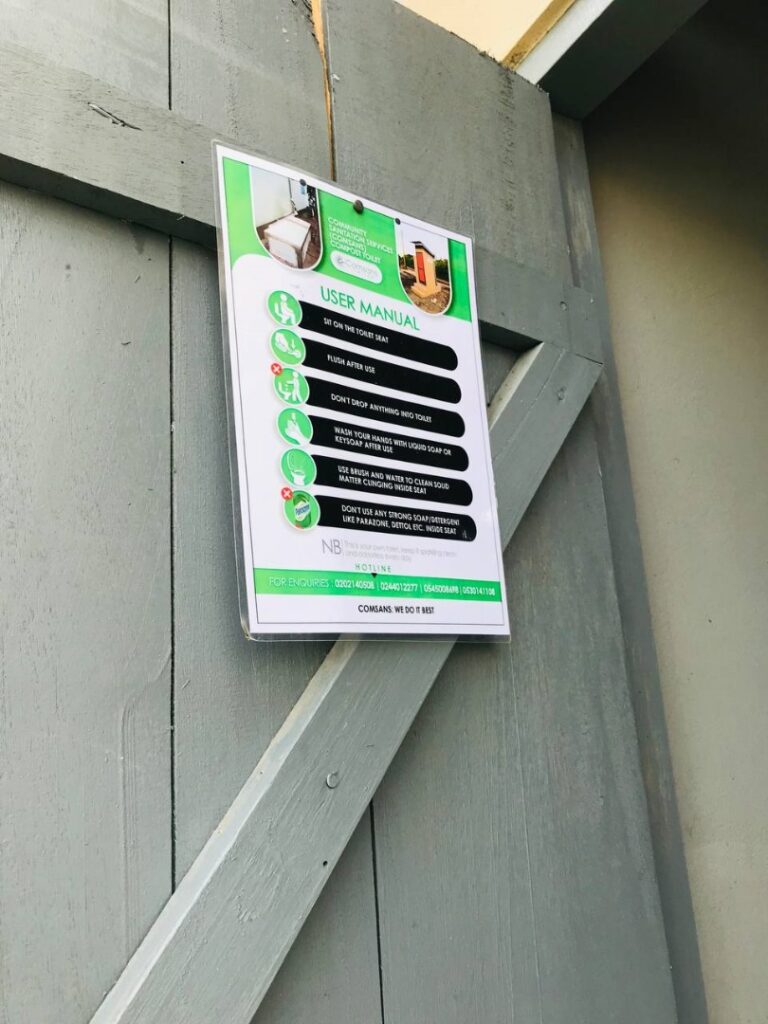
Asking one person to explicate a problem isn’t sufficient, so I approached another project beneficiary and inquired, “Do you also encounter challenges with this project?”
Guess her response… A resounding “Yes!”
Auntie Adwoa explained, “Regarding the challenges, I’ll mention two things. First, the facility remains incomplete, particularly the staircase, which was originally part of the project’s offerings. It’s still unfinished, so we’ve resorted to using a pile of stones as stairs. This makes it difficult for mothers and the elderly to access and use the facility. Even for myself, the first time I tried to use the facility, it was quite an ordeal. You can imagine the struggles that mothers and the elderly face, leading them to consider it a white elephant.”
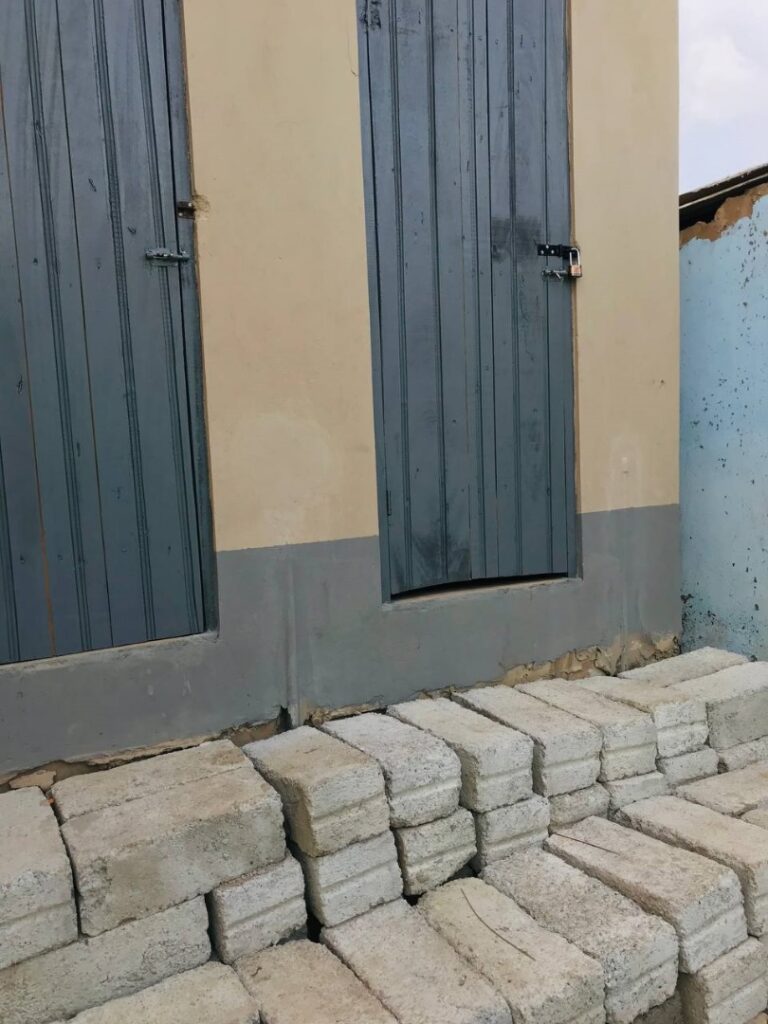
She added, “The inconsistent water supply is another issue. It’s not ideal, and I’m not sure if it’s a problem with the water channel, but it’s definitely a concern.”
These statements affirm that the project is not flawless, and there are issues that GAMA-WSP needs to address to protect the project’s image in the long run.
To further investigate the concerns raised by the second beneficiary, I decided to use the facility myself to see if her remarks were accurate.
To my surprise, after using the facility, I had to step outside to fetch water to clean up, making me contemplate what could happen in the early hours of the morning, considering the recent surge in attacks on people.
At the end of the parent project in 2020, the project achieved the construction of 28,541 household toilets to low income beneficiaries (beneficiary population = 28,541 x 6), 260 schools were provided with 406 units of gender – and disability friendly institutional sanitation facilities, equipped with adequate water supply serving 200,000 school pupils.
Suggestions
As we look ahead, ensuring the ongoing success of sanitation and water access initiatives in the Greater Accra Metropolitan Area (GAMA), such as GAMA-WSP, requires the implementation of several key strategies.
These strategies encompass continued collaboration among stakeholders, comprehensive approaches that address infrastructure, behavioral change, and community involvement, targeted interventions to combat specific challenges like open defecation, regular monitoring and evaluation, community engagement, hygiene education, and a commitment to environmental sustainability.
The successful model of GAMA-WSP can serve as a valuable blueprint for replication in other regions across Ghana facing similar challenges.
Additionally, it’s essential to explore innovative financing mechanisms to ensure the long-term financial sustainability of such initiatives.
Furthermore, a proactive stance must be taken in terms of regular monitoring and inspections, particularly concerning the institutional facilities established as part of these projects. To achieve this, the contact lines for GAMA-WSP should remain active throughout the year, enabling prompt responses to individuals requiring assistance when their bio digesters reach capacity.
This proactive approach is critical in mitigating the issues that arise when facilities are locked due to full bio digesters, which can be a source of frustration for the beneficiaries.
This concern is underscored by the project ratings, where some beneficiaries have given it a score below 4 on a scale of 1 to 5.
They believe that the inconveniences, although the project has had a positive impact on their lives to some extent, should not be disregarded and warrant attention if not, we are not then doing any good to our gradually improved sanitation and hygiene in the Greater Accra Metropolitan Area.
Conclusion
The GAMA-WSP initiative, supported by a $150 million investment from the World Bank, has achieved significant advancements in improving sanitation and water access throughout the Greater Accra Metropolitan Area (GAMA).
It has not only met but exceeded its initial objectives, effectively preventing cholera outbreaks, raising hygiene standards, and surpassing the target for providing household toilets.
Furthermore, GAMA-WSP has bolstered local leadership, introduced innovative solutions, and expanded its positive impact to encompass educational and healthcare institutions.
Despite these accomplishments, there exists an opportunity for further improvement, underscoring the importance of addressing persistent challenges to sustain and advance progress in sanitation and water access within the Greater Accra Metropolitan Area (GAMA).
Godfred Sey/Kwame Acheampong@Ahotoronline.com

